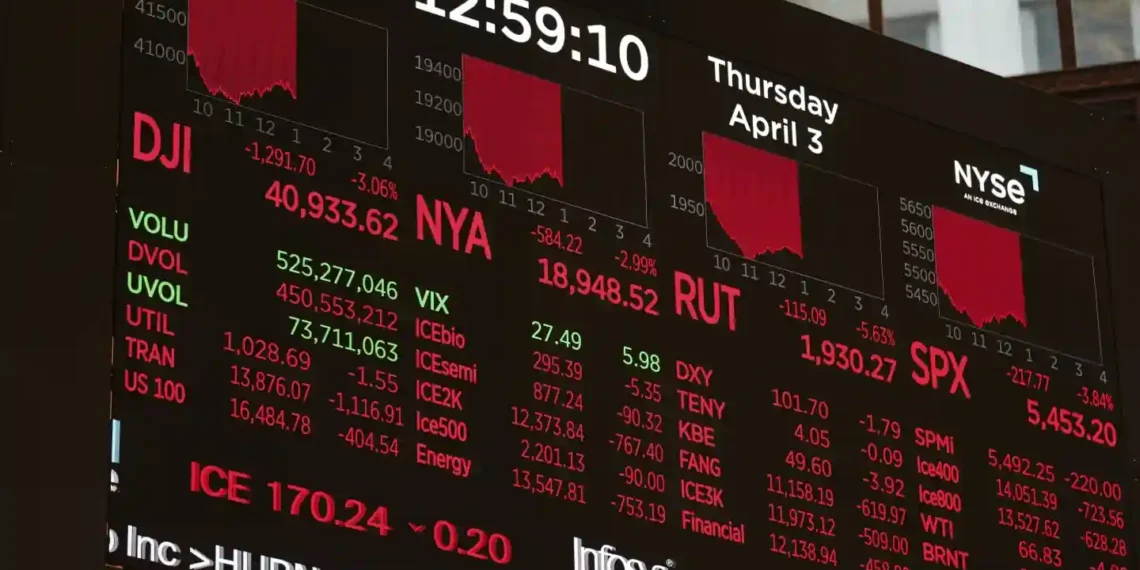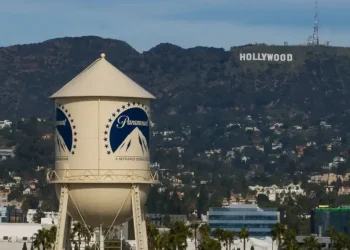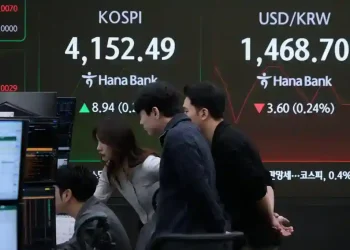Trump’s Tariffs Wipe Out Over $2 Trillion from U.S. Stock Market, Sparking Recession Fears
The U.S. stock market took a massive hit on Thursday, with over $2 trillion in value wiped out after President Donald Trump announced sweeping tariffs on foreign imports. The market suffered its worst single-day drop since the COVID-19 economic crash five years ago, with fears mounting that the new tariffs could push the country into a recession.
Almost every sector experienced significant losses as investors scrambled to offload shares of companies expected to be hardest hit by rising costs. Economists have labeled the tariffs a severe economic blow, warning that they could trigger a chain reaction leading to lower consumer spending, stalled business growth, and a potential economic downturn.
Olu Sonola, head of U.S. Economic Research at Fitch Ratings, described the situation as a “game changer” not just for the U.S. but for the global economy. “Many countries will likely end up in a recession,” Sonola stated.
The S&P 500 plunged 4.8%, erasing more than $2 trillion in market value, according to Howard Silverblatt, a senior index analyst at S&P Dow Jones Indices.
As higher prices put a squeeze on household budgets, discretionary spending—including travel—may be among the first to decline. Airline stocks plummeted:
- United Airlines: -15.6%
- American Airlines: -10.2%
- Delta Air Lines: -10.7%
With most apparel and footwear brands manufacturing overseas, tariffs on imports could drive up costs for both businesses and consumers. Major losses included:
- Nike: -14.4%
- Under Armour: -18.8%
- Lululemon: -9.6%
- Ralph Lauren: -16.3%
- Levi Strauss: -13.7%
Big-box and online retailers, heavily reliant on imported goods, saw their stock values tumble as fears of rising prices and reduced consumer spending set in:
- Amazon: -9%
- Target: -10.9%
- Best Buy: -17.8%
- Dollar Tree: -13.3%
- Kohl’s: -22.8%
Tech companies, many of which depend on foreign parts and manufacturing, are expected to face supply chain disruptions and higher costs:
- Apple: -9.2%
- HP: -14.7%
- Dell: -19%
- Nvidia: -7.8%
A potential recession could reduce borrowing and lending activity, impacting major financial institutions:
- Wells Fargo: -9.1%
- Bank of America: -11.1%
- JPMorgan Chase: -7%
As Americans tighten their budgets, discretionary spending on dining out may decline, leading to drops in restaurant stocks:
- Starbucks: -11.2%
- Cracker Barrel: -12.7%
- Cheesecake Factory: -9.4%
Despite concerns, automakers fared slightly better than other industries, as much of their steel and aluminum is already sourced domestically:
- General Motors: -4.3%
- Ford: -6%
- Tesla: -5.5%
- Stellantis: -9.4%
Economists and analysts will be watching closely to see whether consumer confidence and spending can withstand the financial strain of the tariffs. If spending slows significantly, businesses may cut production, leading to job losses and a broader economic slowdown.
For now, the U.S. stock market remains on edge, with investors bracing for further turbulence in the coming weeks.
This article was rewritten by JournosNews.com based on verified reporting from trusted sources. The content has been independently reviewed, fact-checked, and edited for accuracy, neutrality, tone, and global readability in accordance with Google News and AdSense standards.
All opinions, quotes, or statements from contributors, experts, or sourced organizations do not necessarily reflect the views of JournosNews.com. JournosNews.com maintains full editorial independence from any external funders, sponsors, or organizations.
Stay informed with JournosNews.com — your trusted source for verified global reporting and in-depth analysis. Follow us on Google News, BlueSky, and X for real-time updates.














